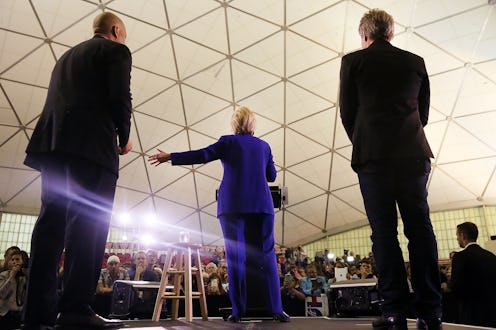News
Technically, Clinton Could Lose Delegates
As primary season nears a close, the nation watched with bated breath as the Associated Press declared Clinton the presumptive nominee the night before the California and New Jersey primaries, putting her right at the 2,383 mark needed to secure the nomination. As the party gears up for their July 25 primary in Philadelphia, one question stands out in the minds of Bernie Sanders supporters: could Clinton still lose delegates at the convention?
The answer has two parts: she can still lose "superdelegates," the party's unbound delegates, but the 1,812 delegates she's won in primaries and caucuses are irreversibly pledged to nominate her at the Democratic National Convention, as per party rules. In short — yes, she can lose the other 571 superdelegates who've announced their support, but not the ones chosen from primaries and caucuses
Despite the superdelegate clause, it's still very unlikely that Sanders could secure the nomination. As Mark Barabak of the L.A. Times put it, Sanders could "theoretically clinch the nomination ahead of the Democratic convention, just as you can theoretically drive from L.A. to San Francisco in two hours" if you drove 200 mph. Technically possible, but incredibly unlikely.
Although Clinton has won enough delegates in primaries and caucuses to clinch the nomination, Sanders said in a speech in Santa Cruz, CA on May 31 that claims that a Clinton nomination is a sure thing are "factually incorrect", and vowed to stay in the race "until the last vote is counted" in next week's Democratic primary in Washington, D.C., the final primary of this election year.
In a recent op-ed in the Washington Times, Newt Gingrich (of all people) claimed ahead of the California primary that Hillary Clinton's presumed nomination in symptomatic of an "oligarchy" and said he believes the Democratic delegate system is allegedly "rigged", an accusation he attributes to Sen. Sanders, although Sanders argued that the delegate system presents a structural disadvantage rather than saying the system as a whole is rigged.
Sanders' colleague, Senate Minority Leader Harry Reid urged Sanders to "give up" ahead of the California primary. Reid said Sanders "better do a little mathing" and look at the numbers prior to the California and New Jersey primaries, when neither candidate had secured the number of delegates to constitute a majority and seal the road to nomination. Now, with Clinton at exactly 2,383 delegates between pledged and superdelegates, Reid's advice rings even truer. All the same, Sanders has yet to concede and is reportedly courting superdelegates in hopes of swaying them in his favor to achieve an unprecedented surprise nomination at the DNC.
Although a Sanders superdelegate coup is possible, it seems improbable that the Vermont senator will leave the July convention with anything other than disappointments. All the same, his campaign moves forward refusing to give up hope of an eleventh hour nomination. If nothing else, this year's election has already proven to be historic, and one of the hardest-fought and most important in recent memory.
